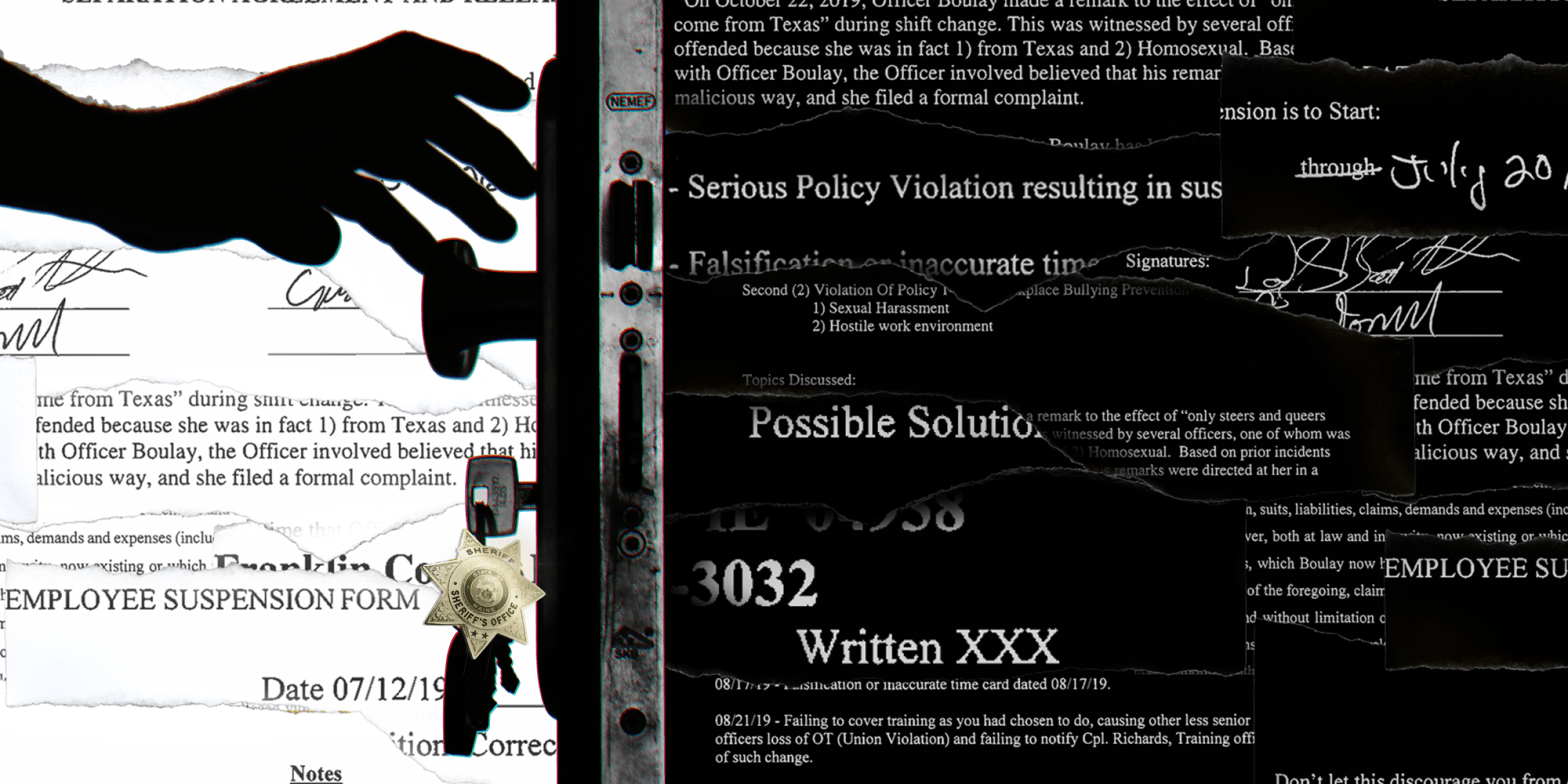
In November 2019, Franklin County made a deal.
Within a five-month period, the Franklin County Detention Center in Farmington had written up Corrections Officer Casey Boulay once for bullying and four additional times for other infractions, including for forcing his coworkers to work 18 hours when he failed to cover a shift. In that time, he had been suspended and demoted from the rank of sergeant.
Now, he was facing a new level of discipline: The jail placed him on paid administrative leave pending a decision by the Franklin County commissioners to fire him for sexual harassment and creating a hostile work environment. While details in his discipline record are limited, the jail found he had made derogatory comments to a female coworker who was gay.
But the commissioners didn’t fire him, which would have been a public decision listed in their meeting minutes. Instead, the county agreed to a private settlement agreement, outlining the terms of his departure. Boulay would resign, and the county would give him a “neutral” reference if prospective employers called in the future.
Both the county and Boulay agreed to keep the details surrounding his resignation confidential and to not make any negative remarks about the other in the future, according to the settlement agreement. Boulay promised not to sue the county, and was allowed to collect all his accrued sick leave and vacation time, and continue his health insurance for a couple weeks.
In addition, the county agreed not to tell the Maine Criminal Justice Academy, the agency in charge of certifying and decertifying corrections and police officers, about his misconduct. That meant the academy couldn’t determine if Boulay should keep his license as a corrections officer.
Anyone who checked Boulay’s records at the academy would see only that he resigned his position Nov. 5, 2019. Anyone who called the county seeking a reference would not be told Boulay had nearly been fired — only his dates of employment and position.
Settlement agreements like the one Franklin County negotiated with Boulay can make it harder for law enforcement agencies to gain information about job candidates’ past performance as police and corrections officers. It means future employers could attempt to hire someone without learning the full scope of the person’s history.
Other states, however, have made changes in recent years to make it easier for police agencies to get information about the officers they’re hiring. Those states now require past agencies to release details about officers who used to work for them, regardless of whether officers signed a confidential settlement agreement, and have given agencies legal immunity to get and share information.
John Cooke is a Republican state senator in Colorado, and a former sheriff, who pushed for that state to more automatically open up the past employment records of law enforcement officers to hiring agencies.
“As a sheriff I don’t want to hire bad deputies. I don’t want somebody out there on patrol who got fired for lying or wrongdoing from another agency,” Cooke said. “You have to look at the greater good and not just pass off your problems. You need to deal with it.”
In Maine, however, there is no requirement that law enforcement agencies check the past personnel files of those they’re looking to hire. While sheriffs in Maine said they conduct background investigations into potential hires and frequently ask job candidates to sign releases to allow them to see officers’ past personnel files, it’s not done 100 percent of the time. Complicating matters, records are not always complete.
If Boulay had worked in Colorado, parts of his settlement agreement would have been moot.
That’s because in 2016 Colorado passed a law requiring officers seeking new employment to allow their former employer to disclose all their conduct-related files — internal investigations, performance reviews, grievances, disciplinary actions and complaints — to potential future employers.
Colorado law enforcement candidates are required to sign an agreement allowing their past employer to release their records. If they don’t sign, they can’t be considered for the job, the law states.
The law didn’t change much for the agencies in Colorado that had already been conducting thorough background checks and not hiring officers whose past employers wouldn’t release information, Cooke said. But that wasn’t the practice of all agencies, so the law created more standardization around the hiring process, and made it easier for agencies to both give and get information.
The difference between Maine and Colorado comes down to automation. Here, the burden is on the hiring agency to thoroughly review their candidates. In Colorado, each candidate that a law enforcement agency interviews for a job must sign over their past employment records.
In Maine, it would be possible for future employers to get former corrections officer Boulay’s final discipline and settlement records from Franklin County if they filed a request under the Maine Freedom of Access Act, but they would need to know to ask. It would also be possible for future employers to get access to his personnel file if Boulay signed a release allowing access, but he would need to agree.
Boulay did not respond to a message seeking comment.
Franklin County Sheriff Scott Nichols did not respond to three emails and two phone calls seeking comment about whether employees who were going to be fired should still get a neutral reference in the future. Academy records show Boulay is currently not working in corrections, but he is technically still certified, meaning he is eligible to work in the field.
Franklin County Clerk Julie Magoon declined to comment.
There is research that shows officers who are fired once for misconduct are more likely than both rookies and veteran officers who have never been fired to either be fired from their next job or receive a complaint for a “moral character violation.” In response, some states are trying to create more surefire ways to bring misconduct to light.
Vermont has a similar law to the one in Colorado. And while Connecticut also requires law enforcement agencies to disclose past behavior to prospective employees, it goes a step further and forbids agencies from hiring police officers who were previously dismissed or resigned while under investigation for “malfeasance or other serious misconduct.”
“There’s a lot more disclosure in the last couple of years. This is beyond decertification. It gets to the same idea. You’d like to know if an officer in one department had problems in a previous department,” said Roger Goldman, an emeritus law professor at the Saint Louis University School of Law, who is an expert on police licensing.
While law enforcement agencies in Maine typically conduct background investigations into their prospective employees’ histories, how rigorous those reviews are depends on the person and agency doing the investigating.
During the last 12 years that Joel Merry has been sheriff of Sagadahoc County, he has had one deputy resign to take a position with another agency, but that hiring agency did not request to see the deputy’s personnel file, he said.
While Maine law allows employers — who do not sign confidential settlement agreements — to share truthful information about former employees to prospective employers, many employers still don’t want to risk it.

“Unfortunately, my experience has been that the former employers are very concerned about civil litigation from the applicant and at times [may] be reluctant to give out too much information,” Cumberland County Sheriff Kevin Joyce said. “A law like Colorado’s that indemnifies the previous employer from civil litigation could be helpful.”
Aroostook County Sheriff Shawn Gillen agreed. His office always conducts background investigations on its potential hires and uses them to figure out whether to request the applicants’ past personnel files, he said. If the former agency and the applicant say there was no discipline, for instance, the Aroostook office likely won’t request the files.
But sometimes past agencies don’t want to say anything about a former officer, even if no one signed a settlement agreement.
The Waldo County Sheriff’s Office requires job candidates to sign a release to access candidates’ past personnel files and “always” checks them, Sheriff Jeffrey Trafton said. If they don’t sign, the hiring process stops.
But if a chief at another agency calls Trafton for a reference on an officer who used to work for Trafton, he won’t say anything without a signed release. Even with a release, if the officer had caused trouble for Trafton in the past, he checks with an attorney first to see what he should say.
“I don’t have a problem with telling the truth. The truth is the truth. It’s what police work is based on,” Trafton said. “Unfortunately it’s not just up to us. The county, the city, we all have attorneys that get involved in these kinds of situations.”
He stopped short, however, of saying he’d favor any law change to require the release of records and give agencies legal immunity to do so, saying he’d need to see the legislation first.
Law enforcement leaders pointed out that there are other ways to get information about someone’s past. For instance, hiring agencies tend to conduct lie detector tests on their prospective hires. Some also conduct psychological exams.
“But there are still no guarantees. In the end, we use all of the information to make hiring decisions that we all hope match the mission, vision and values of our agency,” Joyce said.
The Maine law enforcement community is also small compared with other states’, and word spreads quickly about misbehavior, sheriffs said. But that doesn’t ensure the word of every discipline action gets out. It also doesn’t mean officers with discipline in their pasts, even discipline for alleged crimes, don’t continue to get jobs in law enforcement and corrections.
On Sept. 14, 2018, after a night of drinking, Caleb Farrington, then a corrections officer at the Franklin County Detention Center, went to the apartment of an acquaintance in Farmington. There, he criticized the acquaintance’s mother and girlfriend. When the acquaintance asked Farrington to leave, he “became enraged” and attacked the acquaintance, according to records with the criminal justice academy. Farrington hit the acquaintance multiple times in the face and broke the person’s nose.
Though the victim declined to participate in criminal proceedings, and the district attorney declined to prosecute, the academy, Franklin County and the Farmington Police Department all noted that Farrington’s behavior could have constituted the crime of assault. What’s more, the allegations were substantiated by Farrington’s “own admissions,” according to his county discipline record. As punishment, the county suspended him without pay for two days.
But a month later, Franklin County was investigating Farrington again. While his discipline record does not contain details, it shows he was suspected of violating the jail’s inmate supervision and relations procedure. Suspended pending the outcome of an investigation on Nov. 6, 2018, Farrington resigned immediately.
He got a job 20 days later as a corrections officer at the Maine Correctional Center, a state prison in Windham.

Nichols, the Franklin County sheriff, did not respond to questions about whether he allowed the prison to review Farrington’s Franklin County personnel file before it hired Farrington, whether the prison asked to see it, or whether he reviews job candidates’ past personnel files before hiring his own employees.
Farrington did not respond to emailed questions. A spokesperson for the prison said Farrington had not been disciplined during his time there and said that, as a matter of state law and Maine Department of Corrections policy, it could not comment on whether it had known about his discipline history when it hired him.
Officers don’t appear to be suing their past agencies with any frequency for disclosing their misconduct to a potential future employer, but “at least hypothetically, there is some risk” that makes them hesitant to provide detailed references, said Jeffrey Young, a partner in the law firm Johnson, Webbert & Young who specializes in employment and civil rights law.
As to whether Maine should require agencies to disclose officers’ past records, and release them from liability for doing so, “my knee jerk reaction is it’s something we ought to consider,” Young said. “To be certain, I think you have to have a balance of the public’s right to know and the employees’ rights to a certain extent. The employee needs to have protections, too. How you balance those things, I think legislatures have to grapple with.”






